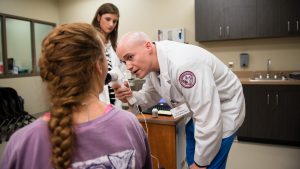By: Bryant Welbourne

A new program in The University of Alabama’s Capstone College of Nursing will strive to combat Alabama’s number one health concern, access to care, by training primary care nurse practitioners to work in rural and underserved areas across the state.
BAMA-Care aims to prepare primary care nurse practitioner students to practice in rural and underserved settings through academic and clinical training via an academic-practice partnership with Whatley Health Services, Inc., one of the largest Federally Qualified Health Centers in West Alabama. In response to an Advanced Nursing Education Workforce grant proposal submitted by Dr. Robin Lawson, senior associate dean for academic programs in the Capstone College of Nursing, the Health Resources and Services Administration of the U.S. Department of Health and Human Services recently awarded more than $650,000 for this academic year to support the program’s launch.
“The goal of the program is to increase the number of primary care nurse practitioners working in rural and underserved communities,” said Lawson. “We will create longitudinal immersive clinical experiences in rural and underserved areas for our family and psychiatric mental health nurse practitioner students to facilitate their employment in those same settings upon graduation.”
According to Lawson, the majority of counties in Alabama are designated health provider shortage areas. Through BAMA-Care, the College hopes to help close the gap between physical and mental health care access and rural Alabamians.
BAMA-Care will recruit and enroll a diverse pool of 36 primary care nurse practitioner students over a two-year period to help increase diversity in the health profession workforce. The program calls for at least 50 percent of participants to be from underrepresented minority groups and/or disadvantaged backgrounds. The College is currently in the process of identifying eligible students for the first year.
Program participants will be placed in WHSI clinics across West Alabama, as well as other health care facilities around the state. Students will receive traineeship support for tuition, books and living expenses while enrolled in the program. Following graduation, students will be eligible to take the family nurse practitioner and/or the psychiatric mental health nurse practitioner certification examination.
“We are extremely excited about the potential this program has to positively impact the health professions workforce in rural and underserved areas,” said Lawson. “It’s an honor to have the capability to improve access to care in Alabama.”
